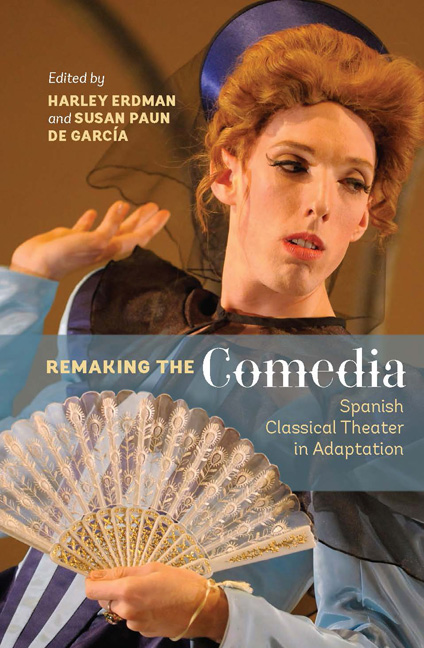Book contents
- Frontmatter
- Contents
- Illustrations
- Contributors
- Preface
- Note to the Reader
- Acknowledgements
- PART I THEORIZING
- PART II SURVEYING
- PART III SPOTLIGHTING
- 11 The Dog in the Manger: The Continuum of Transformation
- 12 El caballero de Olmedo: Los Barracos's Baroque Gentleman
- 13 Corpus Lorqui: Transformation and Transubstantiation in Los Barracos de Federico’s El caballero de Olmedo
- 14 The Phoenix of Madrid: Calderón's No hay burlas con el amor Reborn in Bath
- 15 A Prince in Pittsburgh: “Recasting” a Contemporary Staging of The Constant Prince
- 16 Directing Marta the Divine: Provocative Choices in the Service of the Story
- 17 The Dramaturgy of Absence: Minding the Gaps in Tirso de Molina, Ana Caro, and Feliciana Enríquez
- 18 Translations and Transgressions: Twenty-First-Century Questions Regarding Zayas
- 19 Comedia Actresses, Then and Now: The Case of Ana Caro's Valor, agravio y mujer
- 20 “Kinesthetic Empathy” and the Comedia refundición
- PART IV SHIFTING
- Play Titles Cited
- Works Cited
- Index
19 - Comedia Actresses, Then and Now: The Case of Ana Caro's Valor, agravio y mujer
from PART III - SPOTLIGHTING
Published online by Cambridge University Press: 05 December 2015
- Frontmatter
- Contents
- Illustrations
- Contributors
- Preface
- Note to the Reader
- Acknowledgements
- PART I THEORIZING
- PART II SURVEYING
- PART III SPOTLIGHTING
- 11 The Dog in the Manger: The Continuum of Transformation
- 12 El caballero de Olmedo: Los Barracos's Baroque Gentleman
- 13 Corpus Lorqui: Transformation and Transubstantiation in Los Barracos de Federico’s El caballero de Olmedo
- 14 The Phoenix of Madrid: Calderón's No hay burlas con el amor Reborn in Bath
- 15 A Prince in Pittsburgh: “Recasting” a Contemporary Staging of The Constant Prince
- 16 Directing Marta the Divine: Provocative Choices in the Service of the Story
- 17 The Dramaturgy of Absence: Minding the Gaps in Tirso de Molina, Ana Caro, and Feliciana Enríquez
- 18 Translations and Transgressions: Twenty-First-Century Questions Regarding Zayas
- 19 Comedia Actresses, Then and Now: The Case of Ana Caro's Valor, agravio y mujer
- 20 “Kinesthetic Empathy” and the Comedia refundición
- PART IV SHIFTING
- Play Titles Cited
- Works Cited
- Index
Summary
An actress on the Comedia stage needed more than just a pretty face. Comedia actresses were serious professionals who mastered acting techniques and, because they had to memorize lengthy and complex scripts, learned to read at an early age. Often their roles were physically demanding, requiring them to leap, run, climb, fence, and fly through the air on dangerous stage devices. Then, as now, the actress's body was her instrument. An acting professional of either sex had to remain in excellent condition, as rehearsals and performances could be grueling. As the main draw for many productions, actresses were under particular pressure to stay fit. Because there were few roles for older women (until Moratín began creating them at the end of the eighteenth century), failure to remain youthful and supple could be devastating for an actress's career.
By the seventeenth century, stage movement and gesture were highly codified in Spain. Actors of both sexes were required to learn the gestural language of the stage–movements based on natural or instinctive physical responses but standardized by society and then further refined for theater–in order to bring their characters to life. Furthermore, the two-tier, vertical structure of the corral theater could put serious physical demands on both male and female actors.
Nevertheless, early modern playwrights obviously had confidence in the ability of actresses to meet difficult physical challenges. As a woman herself, Ana Caro knew how capable women could be. Both of Caro's extant plays, El Conde Partinuplés and Valor, agravio y mujer, require exceptional agility and control on the part of not only the lead but also the secondary actresses. In El Conde Partinuplés, actresses must climb high above the stage on tramoyas [stage machinery], soar into the wings, stumble around in the dark, and appear on horseback. Although Valor, agravio y mujer dispenses with stage machinery, the play nevertheless presents physical challenges for both the lead and women in supporting roles.
- Type
- Chapter
- Information
- Remaking the ComediaSpanish Classical Theater in Adaptation, pp. 189 - 196Publisher: Boydell & BrewerPrint publication year: 2015



